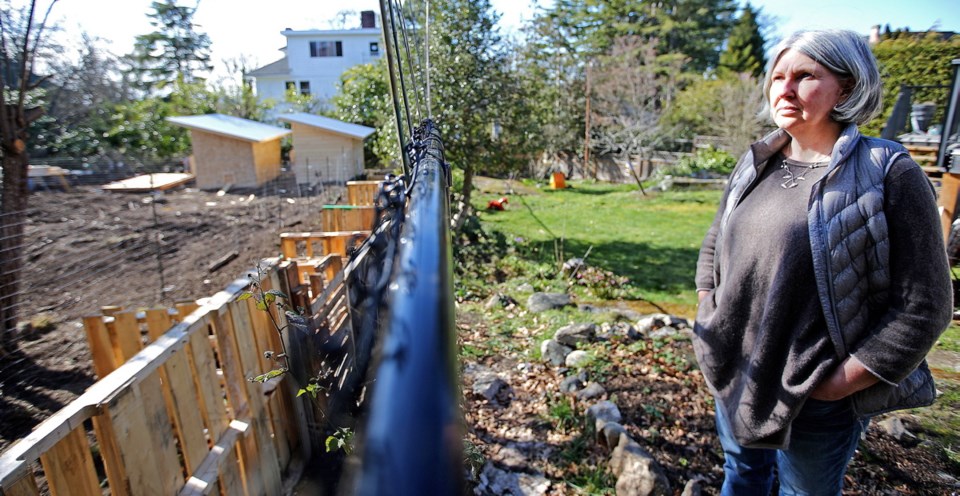I like chickens. Really. A few chickens pecking and scratching in the earth in a back yard is a charming, bucolic sight. But 100 chickens on an urban property is a public-health hazard. Most municipalities in the capital region recognize this, and have put in place regulations relating to backyard poultry, covering such essential issues as the management of compost and chicken waste, distance of coops, runs and compost bins from neighbouring property lines, and protection of the poultry.
Although Victoria city councillors have agreed to amend the animal-control bylaw to limit the number of backyard hens, it comes too late, as the owner of the property next to our Rockland home has brought in 100 chickens.
The city has dropped the ball on this. As a result of this gap in legislation, we now have more than 100 chickens in coops and 20 metres of open compost bins along our property line. The property is more than two acres in size, and yet the owner has chosen to locate the chicken operation at a point with the maximum impact on neighbours, yet a great distance from her house. The 20-by-20-metre field for the chickens is open, with virtually no protection from the sun.
This also promises to be a public-health nightmare. The waste in the open compost bins will attract rats and other vermin. The presence of waste from such a significant amount of poultry is a source of disease, and the odour of open compost bins full of chicken waste and food scraps will be unimaginable. The owner has refused to tell us how she intends to dispose of the chicken waste.
There’s already a rat problem in the area: Government House ceased keeping chickens because of a vermin problem, and Craigdarroch Castle also had a rat remediation issue with its recent renovation. This chicken farm will add to the problem in this densely populated neighbourhood, which includes many apartment buildings (two of which directly border the chicken operation), a nursing home and several bed-and-breakfasts.
Why has Victoria’s city council not moved earlier to address the backyard poultry issue? For many years, officials have warned a series of city councils about the hazards of not having rules in place to govern backyard poultry.
This most recent backyard chicken initiative (which was announced just days after the owner’s application to subdivide the property was turned down by council) was first flagged as an urgent issue in late January.
On Feb. 22, after 2 1/2 hours of debate, council was unwilling to go beyond passing a motion specifying that (a) there should be a provisional limit of 12 hens per lot, and (b) the owner of the chickens should be resident on the lot. The management of waste and compost — the most serious health issue — was not addressed, nor was the issue of care of the chickens.
Moreover, instead of instructing city staff to immediately start drafting bylaws to implement these two decisions, council decided to refer the matter out to the Urban Food Table, an interest group that is not open to public consultation. Then it took another month before council directed that the bylaws be drafted, and engaged the UFT.
We fear that this process will produce the worst of possible results: no immediate action, and lack of balanced public input. Immediate action is required; consultations can come later and can provide input for council to flesh out or adjust bylaws as necessary.
Keeping backyard chickens is a positive activity, and one that contributes to food security. It should not be a polarizing issue, despite some media attempts to portray it in this light. This is about the need for regulation that preserves the rights of legitimate keepers of poultry, the right of neighbours to enjoy their property, the health of the public and the welfare of the animals themselves.
City councillors should be commended for their dedication, and for the long hours they put in, at minimal remuneration, for the residents of Victoria. Some have been working hard on this issue, but this is a time when the whole council must exercise the powers with which we’ve entrusted them to protect us, and especially the health and safety of Victoria residents.
Leadership requires tough decisions. Council should act now.
Phil Calvert is a Rockland resident.



